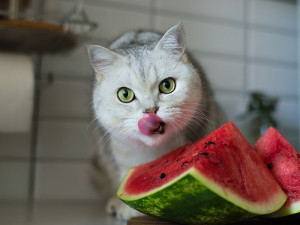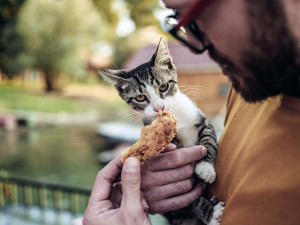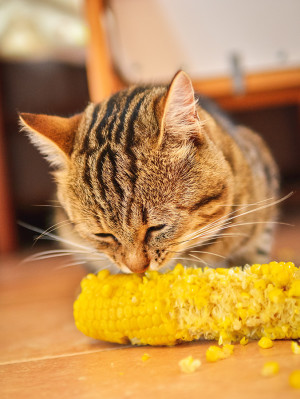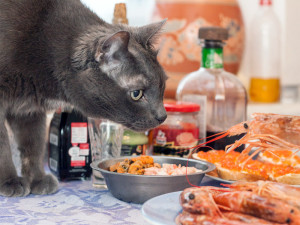Eggs are a breakfast staple for many of us, but have you ever wondered if your cat can take part in their runny, comforting goodness? The good news is yes, eggs are a human food that cats can enjoy. But before you scramble some up for your kitty, it’s important to know how to properly feed them.
In this article, we’ll dive into the benefits eggs may offer your cat and the best way to serve them up. Whether you’ve got a curious cat eyeing your breakfast, or you’re just looking for a new treat to mix into their diet, we worked with an expert to give cat parents the info they need.
Can cats have an allergy to eggs?
Yes, cats can develop allergies to any protein source, including eggs, though veterinarian Dr. Kathryn Dench, chief scientific advisor at Paw Originsopens in new tab, says it’s relatively rare compared to other allergens, like beef or fish. “In my clinical practice, I've observed that a small percentage of cats exhibit allergic reactions to eggs,” she says, “[and they] typically manifest as gastrointestinal upset or skin issues.”
Are eggs actually good for cats?
Eggs can be good for cats! They’re a high-quality source of protein, essential amino acids, and fatty acids, which can improve your cat’s skin and coat health. Eggs also contain vitamins like B12, minerals such as selenium, and a variety of other nutrients that make them a powerhouse of a healthy snack.
How much do you spend on your pet per year?
However, Dr. Dench reminds cat parents that the majority of their kitty’s diet should still be a complete and balanced cat food to ensure they get fully-rounded nutrition. “If their belly is full of eggs and they skip their normal meal, they’ll be missing out on other essential nutrients that are not present in eggs,” she says.
Egg whites vs egg yolks
Egg whites are rich in protein but lower in calories, making them a great treat for overweight cats. Dr. Dench warns, though, that they must always be cooked to avoid the risk of avidinopens in new tab, a protein that can block the absorption of biotin. A deficiency in biotinopens in new tab can lead to numerous health problems in cats.
Yolks, on the other hand, are nutrient-dense, high in fat, and contain vitamins A, D, and E. Yolks can be nutritious for cats, but pet parents should feed them as an occasional snack versus regularly because of the fat and calorie contents — and GI problems like pancreatitis are a possibility if your kitty gets too much fatty content.
How much of an egg should I feed a cat?
Eggs should be fed as a treat versus making up the majority of your cat’s diet, and treats should never make up more than 10 percent of your cat’s daily nutrition. Adding a small amount to your cat’s meals (around a tablespoon or less) can have a nutritional benefit without going overboard.
Can cats eat raw eggs?
No, cats should not eat raw eggs. Cats who eat raw eggs are at risk of Salmonella (which can cause acute diarrhea and other serious health complications), along with avidin in raw egg whites.
Can cats eat cooked eggs?
Cooked eggs are safe and healthier options for cats, according to Dr. Dench. Pet parents should avoid adding any salt or other seasoning to the eggs, and always introduce new foods slowly. When in doubt, bring up feeding cooked eggs to your cat with your vet for more guidance.
Can cats eat boiled eggs?
Boiled eggs are safe for cats so long as they’re fully cooked. “Boiling (or scrambling) the eggs ensures that all potential pathogens are killed,” Dr. Dench explains, which makes them okay for your kitty to enjoy.
Can a kitten eat eggs?
Kittens can eat eggs along with a balanced kitten food, Dr. Dench says, but it’s crucial to introduce any new food gradually. Due to their developing digestive systems, it’s best to start with small quantities to make sure they don’t experience any adverse reactions.
What is the best way to give a cat eggs?
The best way to offer eggs to cats is to cook and serve them plain — no salt, spices, or additives that could be potentially toxic. As with any new food, always introduce them into your cat’s diet gradually and Dr. Dench reminds pet parents to watch for signs of GI upset or allergic reactions.
Does a cat need to eat eggs?
If your cat is on a well-balanced, quality cat food, they’ll be getting all the proper nutrition from their kibble and shouldn’t need to eat eggs. But, a small amount of scrambled or boiled egg can be a yummy and healthy treat option for some cats. Just be mindful of the fat content in egg yolks that can lead to stomach upset or pancreatitis if eaten in excess.
FAQs (People also ask):
Can cats eat eggs?
Cats can eat plain, cooked eggs, but should avoid raw.
How many eggs can a cat eat?
A small amount of boiled or scrambled egg can be a healthy treat for your cat, but you should make sure to give them a primarily cat food diet.
Are eggs safe for cats?
Cats should avoid raw eggs, which carry a risk of salmonella. Egg yolks are nutrient-dense and high in fat, and so can potentially cause stomach upset.













